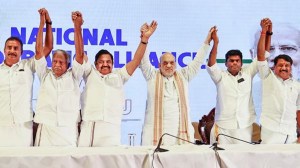Maybe a bomb for the front pages
It is argued that China's nuclear status looks plausible because it crowns huge economic advances. It is just the other way around. Chronolo...

It is argued that China8217;s nuclear status looks plausible because it crowns huge economic advances. It is just the other way around. Chronologically, it is economic advance which crowns China8217;s nuclear might.
When Kissinger first travelled to Beijing, the country was still reeling under the consequences of the Cultural Revolution. Atal Behari Vajpayee will remember how throughout his visit to China in 1979 as the Janata Foreign Minister, he was reminded repeatedly of the nasty works by the Gang of Four which had wreaked havoc on the nation. During that period the Four Modernisations were still in their nascent stages, and China8217;s nuclear status was 15 years old.
In other words, the integration of China into the major league of the global system was on account of its military, not economic, might. Agreed, that was in the context of the Cold War. But do notice how in spite of the Cold War having ended, Chinese stature in world affairs has increased, not diminished, because by now that country has included astout economic string to the bow. So the Chinese have followed the step-by-step approach in a sequence quite the opposite of what our peaceniks seek.
It is not surprising that if you ask international affairs students on any American campus as to what was the most important development in the world in 1971, the answer will invariably be 8220;The opening to China8221;.
You, as an Indian, may be forgiven for feeling a little left out. In our mind 1971 is associated with the creation of Bangladesh, the war with Pakistan, those intense engagements in Chhamb and Longewala, all preceded by the butchering of millions of East Pakistanis by Gen. Tikka Khan8217;s army.I first began to think seriously on where we stood in world affairs after reading Scratches on our Mind, a classic written in the fifties by an MIT professor, Harold Isaac. It dwells on where and how we and the Chinese figure in the American mind.
A discussion on this book took me to the University of Athens in Georgia, where Dean Rusk, after hisretirement as Secretary of State, took a few courses in law. Rusk gave the conversation another twist. 8220;Do you know why Americans are not interested in India?8221; he asked, and proceeded to give the answers. 8220;First, you have made yourselves useless to us in the Cold War. And second, you have never really sought to create a constituency for yourselves in this country.8221; The only effort Rusk remembered when we did some PR in the US was during Vijaylaxmi Pandit8217;s term as ambassador. 8220;She presented a baby elephant to an American zoo. It made front page splash in all American newspapers,8221; he added. 8220;You have never made it to the front pages since8221;.
Throughout his term as ambassador, Siddharth Shankar Ray was able to meet Secretary of State Warren Christopher only once. As for the President, well, he would meet the Pakistani Prime Minister for 20 minutes in the morning and the Indian Prime in the afternoon both at Waldorf Astoria. Conceptually, the two prime ministers had to be yoked together. The mostpathetic picture etched on my mind is that of Prime Minister P.V. Narasimha Rao resting on the lectern alongside President Clinton for the standard press conference after talks at the White House. All the questions were directed at Clinton.
Of the numerous issues preoccupying American journalists there was not one on which the views of the Indian Prime Minister were worthy of being sought.Discussions in Washington or New York with either the Indian Foreign Minister or Prime Minister 8212; for that matter anyone except for the P5 8212; did not receive any notice in the newspapers, not a line. Contrast this with the attention bestowed in India on Ambassador Bill Richardson recently. One national daily devoted a quarter page each day to Richardson for six days in one sequence. Of course, this is all part of the global imbalances, but the scale on which these imbalances manifest themselves on the Indian mind says something of our general sense of uncertainty of where we stand in world affairs.
For a country of oursize and depth with an abiding though sometimes sullen self esteem, the uncertainty as to where we were going to be slotted in the family of nations was disconcerting. The consequent neurosis was in some measure at the bottom of caste, communal, regional tensions.
It would be silly to imagine that a bomb is the ultimate answer. But it could be a beginning. At least it might be an insurance against our being relegated to the next lower slot.
- 01
- 02
- 03
- 04
- 05































